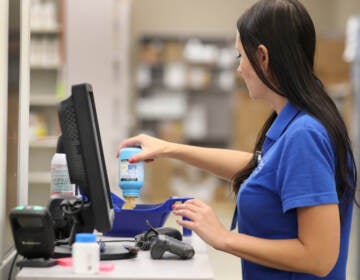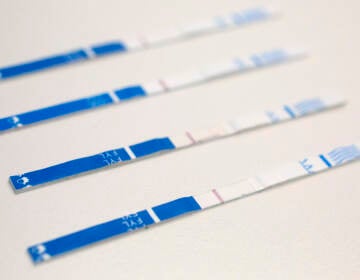New Camden County school program aims to keep students in mental health crisis out of hospital ERs
Local hospital emergency rooms saw about 2,500 school referrals for Camden County students in mental health crisis last year.

File photo: A classroom inside Camden High School. (P. Kenneth Burns/WHYY)
When students at most Camden County schools experience a mental health crisis, they need to get evaluations and clearances before they can return to class.
Most cases don’t require a hospital admission for a student to receive treatment, but with few other options for quick evaluations and clearances, many students and their families end up in emergency departments.
During the last school year, Camden County schools referred students in crisis to emergency rooms at Jefferson Health, Cooper University Health Care, and Virtua Health approximately 2,500 times, according to county officials.
Now, a school program launching this fall aims to provide these services in therapists’ offices and save students from what can be time-consuming, costly, and stressful ER visits.
“Our belief is that there’s a more compassionate way to handle these types of crises,” said Dan Del Vecchio, superintendent of the Camden County Educational Services Commission. “Which is why we started down the path of, how can we redirect students from the emergency department?”
There are an estimated 76,000 students in Camden County who attend public, private, and charter schools in 37 districts.
The new Camden County Schools Wellness Interagency Network (WIN) is a partnership with Oaks Integrated Care, a local community behavioral health organization. It’s funded through a two-year federal grant from SAMHSA, the Substance Abuse and Mental Health Services Administration.
The partnership includes two Oaks Integrated Care clinicians who will triage student crisis cases at office locations in Cherry Hill and Sicklerville.
“Maybe they are experiencing some suicidal ideation, maybe they are experiencing just a behavior and they’re not able to self soothe themselves, so it’s become a disruption,” said Brittany Enright, Oaks Integrated Care program director.
Enright said community licensed clinicians can perform evaluations, determine if any immediate treatment or long-term care is needed, and sign off on clearances.
“This makes it more of an office setting, not a hospital setting,” she said. “[Students] are able to really sit with somebody one on one and have that rapport for the best evaluation possible.”
Enright said the goal is to do same-day evaluations and clearances, or early the next day, following a school crisis referral. She said it’s better than languishing in an emergency department, where the average wait time could be 18 hours or more to see a health provider.
That can be a jarring experience for young children, teens, and their families, Enright said.
“If they’re already going through a traumatic situation, why would we want to put them in another?” she said. “The emergency room is crowded, it’s packed. The goal is to get people in and out and there’s no follow-up care. We’re able to provide some of that.”
Hospital visits can also come with a price tag through insurance costs and billing, said John Pellicane, director of the Camden County Office of Mental Health and Addiction.
“It’s really not a very customer-friendly referral for the parents,” he said.
Students referred for crisis evaluations and clearances through the WIN program will not have to pay for services. At least 22 of the county’s 37 school districts will participate beginning in September.
In addition to the two Oaks clinicians who will see students at their offices, four more licensed providers will rotate between 10 school districts to provide mental health and crisis care to high-risk students.
Not only will they take on some student crisis evaluations and clearances, Enright hopes they will also help meet the rising demand of mental health services in general among youth, especially following the COVID-19 pandemic.
“It is something I feel like is only going to get worse, and we really need to be able to support and provide that quality of care that is so needed for our youth,” she said. “The system is hard to navigate, and this [program] makes it a little bit easier.”

Get daily updates from WHYY News!
WHYY is your source for fact-based, in-depth journalism and information. As a nonprofit organization, we rely on financial support from readers like you. Please give today.






